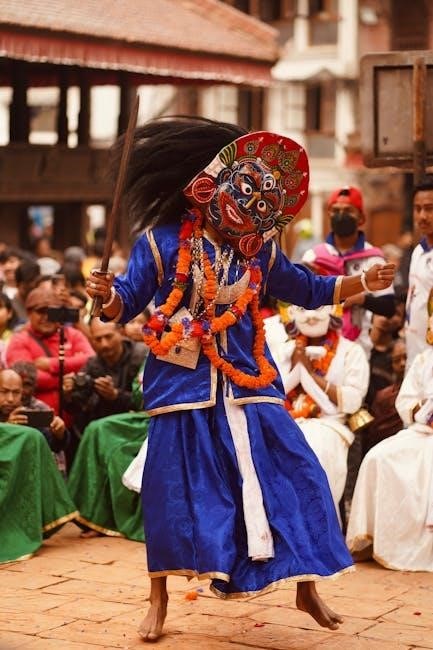Hinduism boasts a vast pantheon of gods and goddesses, each embodying unique powers and roles. While seeking a complete list in PDF format is challenging due to their sheer number, exploring their cultural and spiritual significance offers profound insights into this ancient religion.
Significance of Hindu Deities in Religion and Culture
Hindu deities play a central role in shaping religious practices, cultural traditions, and daily life. They embody divine qualities, guiding followers in moral, social, and spiritual journeys. Festivals like Diwali and rituals honor these gods, reflecting their deep cultural significance. Deities like Ganesha, Lakshmi, and Vishnu inspire devotion, symbolizing strength, prosperity, and preservation. Their stories and attributes are woven into art, literature, and philosophy, making them integral to Hindu identity and global cultural heritage.
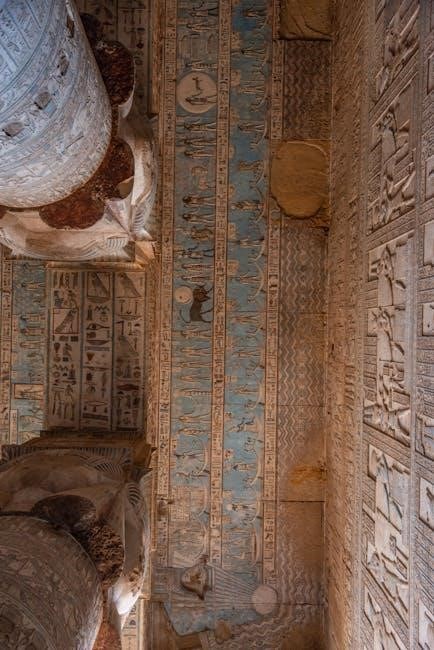
The Trimurti: The Three Primary Aspects of the Supreme God
The Trimurti represents the three fundamental aspects of the Supreme God in Hinduism: Brahma, the creator; Vishnu, the preserver; and Shiva, the destroyer. Together, they embody the cosmic cycle of creation, sustenance, and dissolution, symbolizing the eternal nature of the universe and divine order. This concept underscores the interconnectedness of life and the universe, reflecting Hinduism’s philosophical depth and cosmic harmony.
Brahma: The Creator
Brahma, the creator, is often depicted with four heads, symbolizing the four Vedas. Riding a swan, he embodies wisdom and cosmic creation. He is credited with forming the universe and the four varnas, or social classes. Despite his significant role, Brahma is less worshipped compared to Vishnu and Shiva, as his primary task is complete. His imagery and legends highlight his intellectual and creative essence, making him a revered yet enigmatic figure in Hindu mythology and cosmology.
Vishnu: The Preserver
Vishnu, the preserver, embodies balance and harmony in the universe. Often depicted in a serene form with a blue complexion, he rests on the serpent Shesha and rides the bird Garuda. With four arms, he holds a conch, discus, mace, and lotus. Vishnu’s role is to maintain cosmic order, and his avatars, like Rama and Krishna, exemplify his divine interventions. His consort, Lakshmi, symbolizes prosperity. Worshipped widely, Vishnu’s preserving nature makes him a central figure in Hindu devotion and philosophy, reflecting ideals of protection and sustenance.
Shiva: The Destroyer
Shiva, the destroyer, is a pivotal deity in Hinduism, embodying transformation and cosmic renewal. Often depicted with a third eye and crescent moon, he wields a trident and rides Nandi, the bull. His consort is Parvati, and he is revered in forms like linga and Nataraja, the cosmic dancer. Shiva’s destruction is not chaotic but purposeful, clearing old cycles for new creation. His complex nature balances fierce and benevolent aspects, making him a central figure in devotion and philosophy, symbolizing both annihilation and renewal.
The Tridevi: The Three Primary Goddesses
The Tridevi represents the feminine divine, with Saraswati, Lakshmi, and Durga embodying knowledge, prosperity, and strength. They symbolize the essential aspects of life and cosmic balance.
Saraswati: Goddess of Knowledge and Arts
Saraswati, the goddess of knowledge, music, and arts, is often depicted playing a veena. She embodies wisdom and creativity, inspiring scholars and artists alike. Her association with the swan symbolizes purity and grace. As the consort of Brahma, she is revered for her role in the creation of Vedas. Saraswati is celebrated during Vasant Panchami, a festival marking the arrival of spring and the renewal of learning. Her significance underscores the importance of education and cultural enrichment in Hindu tradition.
Lakshmi: Goddess of Prosperity and Fortune
Lakshmi, the goddess of prosperity and fortune, is revered as the wife of Vishnu and the embodiment of wealth and light. Often depicted with four arms and seated on a lotus, she symbolizes spiritual and material prosperity. Her festival, Diwali, celebrates her divine presence in every home. Lakshmi is believed to grant boons to her devotees, ensuring their well-being and success. Her grace is sought in daily life, making her a central figure in Hindu worship and traditions.
Durga/Devi: Goddess of Strength and Protection
Durga/Devi, the Goddess of Strength and Protection, is a powerful deity embodying divine energy. Often depicted as a fearless warrior, she symbolizes the triumph of good over evil. As a protector, she is invoked to dispel fears and empower individuals. Her festival, Navratri, honors her nine divine forms. Known as Shakti, she represents the feminine energy of the universe. Her grace is sought for strength and resilience, making her a central figure in Hindu worship and mythology, inspiring devotion across generations.
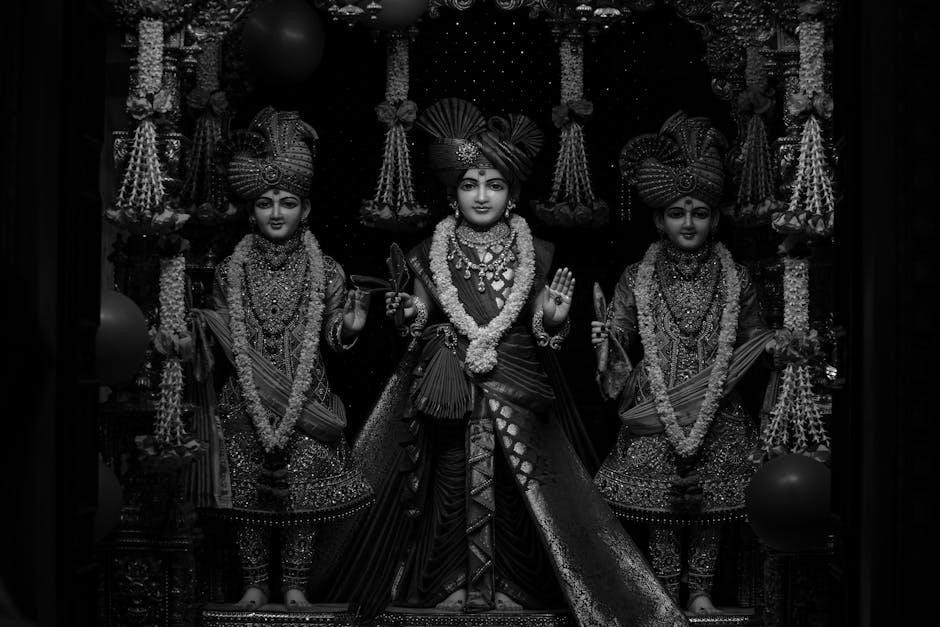
Other Prominent Hindu Gods and Goddesses
Hinduism features a diverse array of deities beyond the Trimurti and Tridevi, each with unique roles and significance. These gods and goddesses embody various aspects of life and nature, reflecting the richness of Hindu spirituality and cultural heritage.
Ganesha: The Remover of Obstacles
Ganesha, the elephant-headed deity, is revered as the remover of obstacles and the granter of wisdom. With a rotund belly and a mouse as his vehicle, he embodies benevolence and intelligence. Often worshipped at the start of new endeavors, Ganesha is a symbol of prosperity and good fortune. His significance extends beyond mythology, as he is deeply ingrained in Hindu culture, particularly during the festival of Ganesh Chaturthi, where his idol is ceremoniously worshipped and immersed in water.
Hanuman: The Divine Monkey God and Devotee of Rama
Hanuman, the divine monkey god, is a steadfast devotee of Lord Rama and a pivotal figure in the epic Ramayana. Known for his immense strength, loyalty, and devotion, Hanuman is often depicted as a monkey with extraordinary abilities. His unwavering dedication to Rama and Sita exemplifies the ideals of duty and selflessness. Hanuman is also revered for his wisdom and is often invoked for courage and protection. His iconic leap across the ocean to rescue Sita symbolizes determination and faith, making him one of Hinduism’s most beloved deities.
Lesser-Known but Important Deities
Kartikeya, the six-headed god of war, and Ganga, the sacred river goddess, are lesser-known but significant deities in Hindu mythology, embodying strength and purity.
Kartikeya: The God of War
Kartikeya, the six-headed god of war, is a significant deity in Hindu mythology. Born to Shiva and Parvati, he is celebrated for his bravery and strategic mind; Known as Murugan in South India, Kartikeya is often depicted as a youthful warrior riding a peacock. He is revered for defeating the demon Taraka and restoring peace. His festivals, such as Skanda Sashti, highlight his divine prowess. Kartikeya symbolizes courage, wisdom, and the triumph of good over evil, making him a cherished figure in Hindu culture and worship.
Ganga: The Goddess of the Holy River
Ganga, the goddess of the Ganges River, is revered as a sacred deity in Hinduism. She is often depicted as a flowing river, symbolizing purity and divine grace. According to legend, Ganga descended from heaven to Earth to purify the ashes of Sage Sagara’s sons and to break Shiva’s deep meditation. She is worshipped for her power to cleanse sins and grant salvation. Her festivals, such as Ganga Dussehra, celebrate her divine presence, making her a central figure in Hindu spiritual and cultural life. Her significance transcends time and tradition.
The Concept of Avatars in Hinduism
Hinduism defines avatars as divine incarnations of deities to restore balance and dharma. Vishnu’s avatars, like Rama and Krishna, exemplify this concept, serving as manifestations of divine intervention in human affairs.
Key Avatars of Vishnu and Their Significance
Vishnu, the preserver, incarnates in various forms to restore cosmic order. His avatars include Matsya (fish), saving humanity from a flood, and Kurma (tortoise), aiding the churning of the ocean. Varaha (boar) rescued the earth, while Narasimha (half-man, half-lion) destroyed tyranny. Vamana (dwarf) humbled pride, and Parashurama (warrior) ended unjust rule. Rama and Krishna epitomized righteousness and divine love. Buddha and Kalki represent spiritual awakening and future redemption, showcasing Vishnu’s diverse roles in maintaining balance and inspiring humanity.
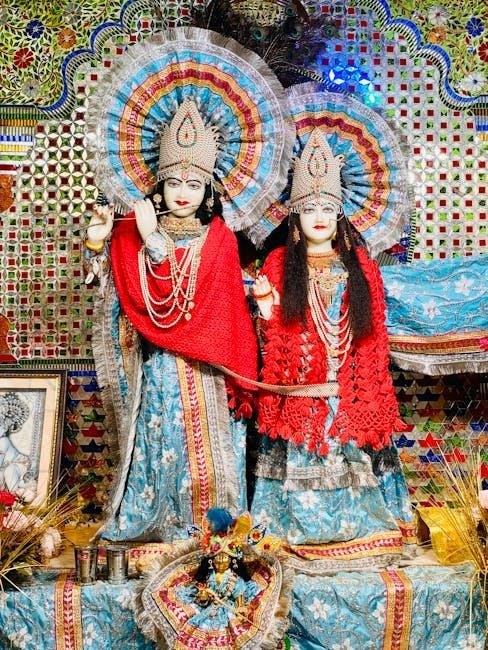
Cultural and Historical Significance
Hindu gods and goddesses deeply influence culture, traditions, and history. Festivals like Diwali reflect their stories, while their roles in epics and art highlight their enduring cultural impact.
The Role of Hindu Gods and Goddesses in Daily Life and Festivals
Hindu gods and goddesses play a vital role in daily life and festivals, guiding rituals, prayers, and celebrations. Deities like Ganesha and Lakshmi are worshipped for prosperity and wisdom, while festivals such as Diwali honor their divine stories. Their presence in art, music, and traditions underscores their cultural significance, fostering spiritual connection and community bonding. This integration of deities into everyday life reflects the deep-rooted faith and reverence in Hinduism.
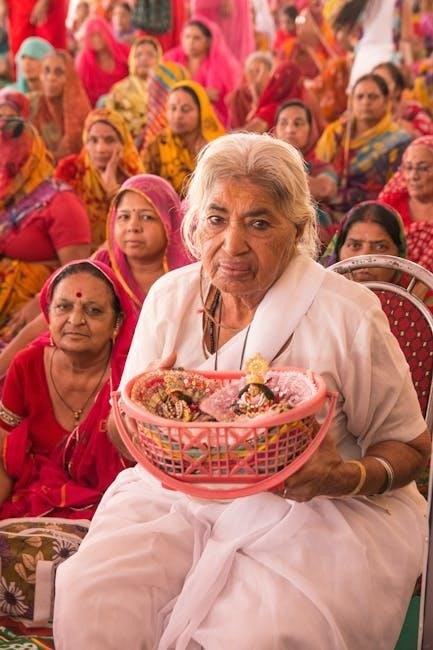
How to Find a Complete List of Hindu Gods and Goddesses in PDF
Search reputable sources like the Internet Archive or scholarly publications for comprehensive PDFs, such as Swami Harshananda’s works, though a truly complete list remains elusive.
Recommended Sources and Resources
For a comprehensive understanding, explore resources like Encyclopaedia of Hindu Gods and Goddesses and works by Swami Harshananda. The Internet Archive offers free PDFs, including “Indology Books” and “Hindu Gods and Goddesses.” These texts provide detailed insights into various deities, their roles, and cultural significance, making them invaluable for both researchers and enthusiasts seeking a complete list of Hindu gods and goddesses in PDF format.
- Encyclopaedia of Hindu Gods and Goddesses
- Swami Harshananda’s works
- Internet Archive collections
Hindu gods and goddesses embody endless diversity, each representing unique aspects of life and spirituality. Their cultural and religious significance continues to inspire and guide millions globally.
The Endless Diversity of Hindu Deities and Their Importance
Hinduism’s vast pantheon reflects its rich cultural and spiritual heritage. Each deity, like Ganesha, Lakshmi, and Shiva, embodies unique qualities and roles, shaping devotees’ lives. Their stories and symbolism inspire moral, ethical, and spiritual growth. From major gods to lesser-known deities, their diversity highlights the complexity of human experiences. Festivals and rituals celebrate their significance, emphasizing their enduring influence in daily life. While compiling a complete list in a PDF may be challenging, their impact on culture and faith remains profound and unifying.
